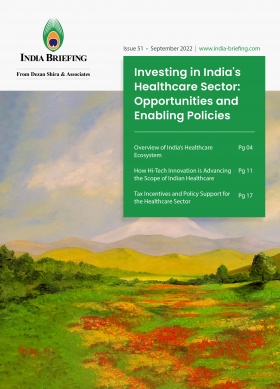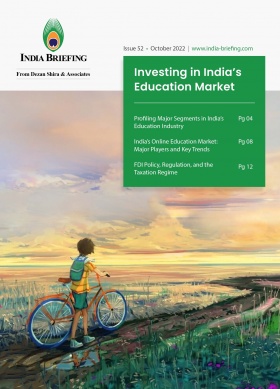India-Australia ECTA in Force from December 29, 2022: Key Benefits
The India-Australia Economic Cooperation and Trade Agreement (ECTA) recently entered force on December 29, 2022. Under the pact, Australia is offering zero-duty access to India for about 96.4 percent of exports (by value) from the day the agreement is enforced. In this article, we detail the specifics of the ECTA and discuss how they will boost India’s trade and investment prospects.
On December 29, 2022, the India-Australia Economic Cooperation and Trade Agreement (ECTA), which was signed on April 2, 2022, entered into force. Over the next five years, it is anticipated that the India-Australia ECTA, which aims to improve trade and investment opportunities between the two nations, will propel bilateral trade to US$50 billion Australia trade to cross US$45-50 billion from the existing US$31 billion.
According to the agreement, Australia would grant India preferred market access on all of its tariff lines. All of the labor-intensive industries with export potential for India are included in this, including gems and jewellery, textiles, leather, footwear, furniture, food, agricultural products, engineering products, medical technology, and autos.
Meanwhile, India will grant Australia preferential access to over 70 percent of its tariff lines, including those that are relevant to Australia from export perspective, including raw materials and intermediaries like coal, mineral ores, wines, etc.
In this post, we go over the specifics of the ECTA and describe how they would help the Indian economy.
What are the salient features of India-Australia ECTA?
The India-Aus ECTA provides for an institutional mechanism to encourage and improve trade between the two countries and covers almost all the tariff lines dealt in by India and Australia respectively. It encompasses cooperation across the entire gamut of bilateral economic and commercial relations between India and Australia, and covers areas like:
- Trade in goods
- Rules of origin.
- Trade in services.
- Technical barriers to trade (TBT).
- Sanitary and phytosanitary (SPS) measures
- Dispute settlement
- Movement of natural persons
- Customs procedures.
- Telecom, pharmaceutical products, and cooperation in other areas.
|
Terms and Conditions of India India-Australia ECTA |
||
|
Categories |
Features |
|
|
Trade in goods |
Exports from India to Australia |
Australia will provide zero-duty access to India for 100 percent of its tariff lines in two categories under this Agreement:
|
|
Imports from Australia to India |
|
|
|
Rules of origin |
Strict rules of origin have been included to prevent third-party goods routed through the partner country from getting preferential treatment under ECTA. |
|
|
Trade remedies |
|
|
|
Trade in services |
|
|
|
Dispute settlement |
|
|
|
Resources for Information and Procedural Assistance on India-Australia ECTA |
|
|
Customs notifications |
Customs tariff concessions |
|
Director general of foreign trade (DGFT) notifications and public notices |
|
|
Trade Notice on Electronic filing and Issuance of Preferential certificate of Origin |
|
|
DGFT Helpdesk for Common digital platform for issuance of Certificate of Origin (CoO) |
Phone: 1800-111-550 |
|
Email: coo-dgft@gov.in |
|
|
Website for online registration: coo.dgft.gov.in |
|
How will the India-Australia ECTA benefit India’s trade and investment prospects?
According to Sanjay Budhia (Chairman, Confederation of Indian Industry (CII) National Committee on EXIM), “The India-Australia ECTA is expected to boost investments, enhance market access, create additional job opportunities, and most importantly strengthen the bilateral ties of two important players in the Indo-Pacific region.” According to the Global Trade Research Initiative (GTRI), bilateral trade between India and Australia is expected to reach US$70 billion by 2028.
According to GTRI, trade with a value of US$23 billion would become duty-free from the day the agreement is enforced, i.e., December 29, 2022. This value accounted for 93 percent of merchandise trade between India and Australia in the financial year (FY) 2022. In the same period, India’s goods exports to Australia valued US$8.3 billion and imports were about US$16.7 billion. Two-way trade in goods and services in FY 2020 were valued at US$24.3 billion. India’s merchandise exports to Australia grew 135 percent between 2019 and 2021.
This trade agreement is expected to bring immediate progress in India’s labor-intensive sectors, which will see a removal of import duties ranging from four to five percent. Furthermore, this agreement is also estimated to create 40,000 additional jobs in the Indian textile sector and increase mobility for Indian working professionals in 11 sectors.
Besides providing cheaper raw materials to many sectors, including steel and aluminum from Australia, the ECTA would also facilitate increased investments from Australia and support Indian manufacturing. Further, the Confederation of Indian Industry (CII) expects that the deal would allow large Indian IT companies to increase their involvement in Australian government projects.
(This article was first published on January 2, 2023 and last updated on January 12, 2023.)
Related reading
About Us
India Briefing is produced by Dezan Shira & Associates. The firm assists foreign investors throughout Asia from offices across the world, including in Delhi and Mumbai. Readers may write to india@dezshira.com for more support on doing business in in India.
We also maintain offices or have alliance partners assisting foreign investors in Indonesia, Singapore, Vietnam, Philippines, Malaysia, Thailand, Italy, Germany, and the United States, in addition to practices in Bangladesh and Russia.
- Previous Article India to Surpass China’s Population in 2023: Here’s Why That Matters
- Next Article India-China in 2023: Bilateral Trade and Investment Prospects










